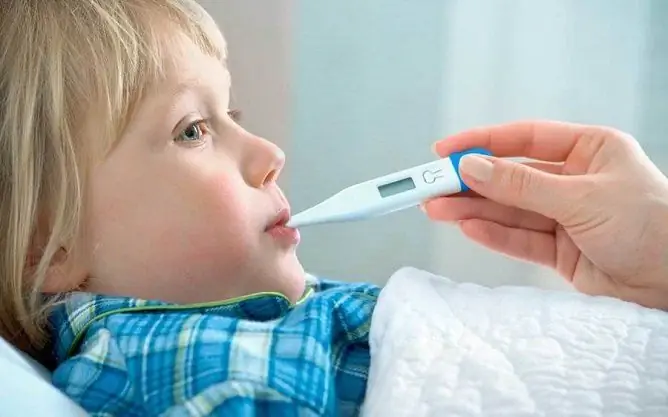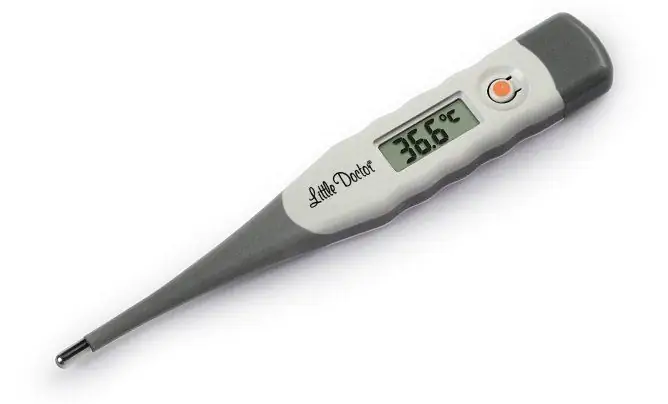- Author Rachel Wainwright wainwright@abchealthonline.com.
- Public 2024-01-15 19:51.
- Last modified 2025-11-02 20:14.
Angina without fever: symptoms in adults and children, treatment
The content of the article:
- Factors influencing the development of the disease
-
What signs of angina without fever can be in adults and children
Features of the development of angina during pregnancy
- Diagnostics and treatment
- Possible complications
- Video
Angina without fever is a fairly common occurrence, since the absence of this symptom indicates a catarrhal form of the disease, observed in 90% of cases. It belongs to the group of banal acute tonsillitis, which are most common in patients.

In some cases, angina is not accompanied by an increase in body temperature
In general, angina flowing without temperature in a child or an adult characterizes a milder course of the disease, without a deep inflammatory process. The causative agents are usually bacteria or viruses that enter the respiratory tract by airborne droplets upon contact with a carrier of infection.
An alimentary route of infection is not excluded, in which pathogens enter the body when eating contaminated products, insufficient hand hygiene or using household items on which they are located.

The causative agents of sore throat can be transmitted by the alimentary route if personal hygiene is not followed
Factors influencing the development of the disease
In the presence of the following conditions / diseases, the risk of developing sore throat increases:
- purulent inflammation of the nasopharynx: sinusitis, nasopharyngitis, sinusitis and others;
- caries, periodontal disease, inflammatory processes in the oral cavity;
- autoinfection;
- frequent hypothermia;
- malnutrition;
- trauma to the glands;
- decreased immunity due to overwork, deficiency of vitamins and minerals, previously transferred infectious diseases.
What signs of angina without fever can be in adults and children
Acute tonsillitis, regardless of its form, goes through 4 stages:
- Incubation period.
- First stage.
- Complete development of the clinical picture.
- Reconvalescence (relief of symptoms).
The incubation period is relatively short. The disease can manifest itself already after 10 hours from the moment of infection, and sometimes this process is delayed up to 2 days. The onset of the pathology is always acute - there is discomfort, burning and sore throat, chills, pain when swallowing both food and water.
With follicular and lacunar angina, the body temperature can rise to 39-40 ° C, while the catarrhal form can proceed without fever at all or at values not exceeding 37-38 ° C.

Lymph nodes with angina increase
In addition to these signs, angina can be accompanied by severe headache, rapid fatigue, lack of appetite, drowsiness and aching bones. A physical examination of the oropharynx reveals a dense white coating on the tongue, hyperemia of the palatine arches and glands, as well as their increase in size. On palpation of the lymph nodes, their slight increase is noted.
In a severe course of pathology, changes in the composition of the blood are recorded, a specific plaque, purulent exudate or ulcers in the gland area are observed. Symptoms include indigestion, muscle pain and increased sweating.
Catarrhal angina is most often diagnosed in children 4-5 years of age. With a timely start of treatment, its manifestations can be completely stopped within 5-6 days. If you do not carry out therapy for the disease or do not bring it to the end, pathology may flow into more severe forms or into prolonged chronic tonsillitis.
Features of the development of angina during pregnancy
During pregnancy, a sore throat, even without the accompanying high fever, is dangerous. Severe angina for the mother is fraught with increased signs of intoxication, and for the fetus - the transfer of toxins through the blood and, as a result, a high risk of developing pathologies.

If symptoms of sore throat appear during pregnancy, even not accompanied by an increase in body temperature, you should consult an ENT doctor.
If acute tonsillitis is not treated promptly, complications from the kidneys and heart are possible, which during pregnancy can lead to termination or premature birth.
Diagnostics and treatment
Early diagnosis is of particular importance for the complete relief of signs of pathology. A sore throat flowing without an increase in temperature is easy to confuse with other infectious processes, which is why when the first symptoms appear, it is important to seek help from an otolaryngologist. In addition to collecting anamnesis and physical examination of the patient, the doctor performs pharyngoscopy, during which he takes a photo of the throat and can note obvious manifestations of pathology.

To diagnose and prescribe adequate treatment, it is necessary to undergo the studies prescribed by the doctor.
The list of tests carried out to confirm the diagnosis includes:
- general analysis of blood and urine;
- clinical blood test;
- bacteriological inoculation.
Differential diagnostics plays a significant role - on the basis of laboratory and instrumental studies, taking into account the patient's complaints, the doctor determines with greater accuracy whether there can be a sore throat without fever in a particular case, or make a different diagnosis.
The absence of fever, although it indicates a mild course of the disease, but with bacterial genesis requires a full course of antibiotic therapy. In the acute period, bed rest and limited contact with others are recommended to avoid the spread of infection. If you have an appetite, preference should be given to puree, warm, not solid or spicy foods. The most useful drinks are warm teas, fruit drinks and compotes.

In the acute period of angina, preference is given to warm, puree-like food
The main treatment for angina of bacterial genesis is to take antibiotics, viral and fungal - antiviral and antifungal agents, respectively. Among antibacterial drugs, penicillins and cephalosporins are usually prescribed, less often macrolides.
Some of the most effective drugs in these groups are:
| A drug | Application features |
| Flemoxin | Penicillin antibiotic in pill form. An explanation of the dosage to take the drug is given by the doctor, taking into account the severity of the inflammatory process. Since the tablets can be dissolved in water, they can be taken in young children who are difficult to drink solid tablets. Therapy is carried out for 5-10 days, even with earlier relief of the symptoms of pathology |
| Clarithromycin | Macrolide, available in tablets of various dosages. Contraindicated in porphyria, in the first trimester of pregnancy, during lactation and in children under 12 years of age |
| Ceftriaxone | A cephalosporin antibiotic in powder form for preparing a solution for intravenous or intramuscular injection. Used when penicillins and macrolides are ineffective or intolerant. In acute tonsillitis, it is administered parenterally at the dose prescribed by the doctor |
The following are commonly used as supportive and symptomatic treatment:
- bacteriostatic drugs from a number of sulfonamides (for example, Streptocid, Biseptol);
- antiseptic agents: lozenges, sprays, aerosols, throat rinses (Chlorophyllipt, Furacilin, Ingalipt, Cameton, Stopangin, Septefril, Hexoral, Faringosept, Stopangin, Tantum Verde, Efizol and others);
- antipyretics (Paracetamol, Nurofen and others) at a high temperature, however, if angina occurs at rates below 38 ° C, their appointment is inappropriate;
- vitamin and mineral complexes.
From physiotherapeutic methods, inhalations with medicinal solutions, centimeter wave therapy are shown.

In addition to antibiotic therapy, inhalations with drugs are often prescribed
Homeopathic medicines can be used to restore immunity and stimulate the body's defense mechanisms against the background of acute tonsillitis. The choice of a specific remedy depends on the stage of the pathology, its manifestations, the general condition of the patient, his psycho-emotional and constitutional characteristics. Only a qualified homeopathic doctor can take into account all the nuances and prescribe effective medications.
They can be different in composition - herbal, vegetable, honey, soda or salt. It is important to use such medications only on the recommendation of an otolaryngologist in addition to the main treatment.
Possible complications
Acute tonsillitis belongs to a group of pathologies that, with self-medication or the absence of effective therapy, are fraught with the development of serious complications. These include:
- cardiac form of rheumatism, myocarditis;
- pyelonephritis, glomerulonephritis, renal failure;
- rheumatism, arthritis, bursitis and other pathologies that affect the mobility of the joints;
- otitis;
- laryngeal edema, lymphadenitis;
- bronchitis, pneumonia;
- apnea;
- meningitis, sepsis.
It is much more difficult to treat chronic tonsillitis; in advanced cases, surgical intervention may be required, in which partial or complete removal of the tonsils is performed.
Of particular importance for the prevention of potential complications of the disease is the full course of antibiotic therapy prescribed by an otolaryngologist. After the end of the treatment of angina, the cause of the development of which was a streptococcal infection, it is recommended to pass blood / urine tests and an electrocardiogram.
Video
We offer for viewing a video on the topic of the article.

Anna Kozlova Medical journalist About the author
Education: Rostov State Medical University, specialty "General Medicine".
Found a mistake in the text? Select it and press Ctrl + Enter.






